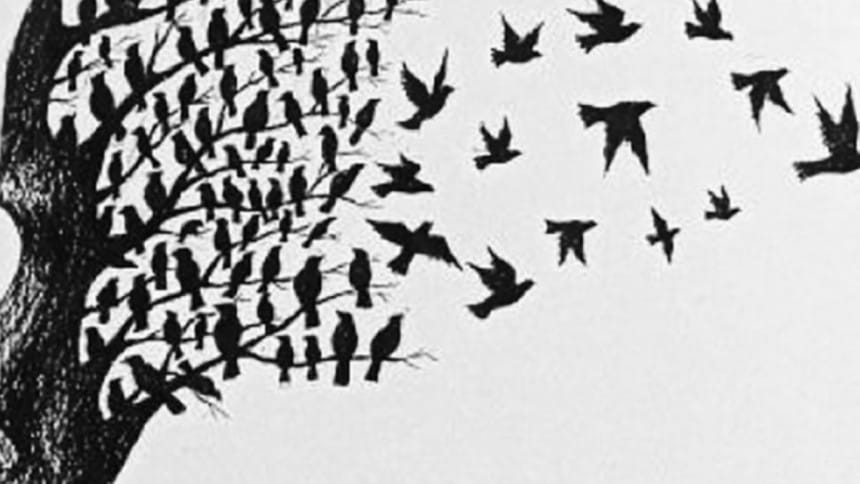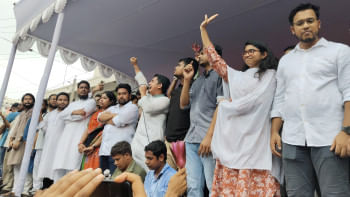Addressing psychosocial disabilities in disaster management

Recently, I came across a friend's Facebook status that read: "The rain is supposed to bring forth life from land, and comfort our stressful minds. Not flood our cities and villages, nor wash away homes and livelihood. What have we done? How poorly have we designed our world?" Nadine Shaanta Murshid, in her article published by The Daily Star on August 23, 2017, has rightly pointed out that "when we ascribe floods as 'natural disaster' we must ask ourselves how 'natural' the causes really are." And regardless of how "natural" or artificial the disasters are, there are some who suffer the consequences of a disaster more than others.
Here are some facts that have not been part of the mainstream discussion on disaster management:
As reported on the Star Weekend, April 21, 2017, the Rana Plaza accident killed over 1,100 people while many of the survivors suffered from psychosocial disabilities. Four years on, many of the 2,500 and more survivors still showcase symptoms of being unwell, according to counsellors working with Rana Plaza survivors and families of victims. The rehabilitation initiative taken up by some NGOs was perhaps the first of its kind to address disabilities in disaster management.
As we face another disaster in the form of a flood in northern Bangladesh, following onrush of water from the upstream and incessant rains, we must ask ourselves, how are those with psychosocial disabilities coping with this disaster? Bangladesh has the highest natural disaster mortality rate in the world, with over half a million people lost to disaster since the 1970s. Most of these people have died during floods or cyclones, both of which are likely to become more frequent due to the impacts of global climate change. Recent floods are the worst to have hit the region in decades. Till date, the government's disaster response strategy has focused, increasingly and perhaps effectively, on the physical needs of the survivors through the provision of shelter, food and physical medical care.
However, there has been no policy provision, compensation or support for those with disabilities, who are among the most vulnerable during a calamitous event. People with physical disabilities struggle with evacuation, getting relief and are more susceptible to accidents caused by natural disasters. But the mental health consequences of the disasters receive even less attention.
According to a 2006 study by the National Institute of Mental Health (NIMH), 96.9 percent of the individuals with psychosocial disabilities are from the lower-middle socioeconomic class. This makes them the most vulnerable population, requiring support especially during disasters such as floods. Our disaster management policy falls short of addressing mental health issues because, among other reasons, when we refer to "mental illnesses," we do not take into account the pervasive stereotypes, attitudes and other barriers that result in inequalities affecting the people with mental illnesses.
Mental illness denotes a number of changes that can affect our thinking, our mood, our sense of pleasure and our behaviour. Typically though, people view mental illness as a malfunctioning of one's brain and do not consider the social factors that result in mental health conditions. A mental health condition, unless inherited, usually results from an adverse social or environmental situation. In this case, if we consider flood as an environmental factor, we need to address the mental health condition of the victims in our disaster management programmes. Not providing support to those who are already vulnerable further demoralises and disenables them from recovering.
Since the responsibility to support people with disabilities lies with the Ministry of Social Welfare, district administrations are supposed to have lists of such individuals and they can provide adequate support to them during disasters such as floods, but to what extent that is actually practiced is a big question. That there is no systemic study and evaluation of the plight of people with physical or psychosocial disabilities in such situations is a testament to the negligence meted out towards disability in general.
One may brush aside the plight of the most marginalised as one not of immediate concern. One may also wonder if it is possible to do anything about this issue. In case one is wondering, a case study of a nation with similar resource limitations may help. Like Bangladesh, Sri Lanka had a limited number of psychiatric professionals. In 2007, they had only 25 psychiatrists for a population of 20 million people. After the Indian Ocean Tsunami in 2004 that took 30,000 lives and displaced over one million people, the Sri Lankan government adopted a comprehensive mental health plan to address the widespread mental health conditions that ensued.
It developed a category of community mental health workers known as Community Support Officers. These volunteers, receiving small monetary incentives, were tasked with providing social support and psychological first aid and identifying people in need of additional mental health services, under the supervision of mental health professionals. They have contributed to the detection and referral of affected individuals, and provided support in their own communities. Findings of a study in three districts in the southern province of Sri Lanka showed that community support officers had referred more than half of all inpatients, and this proportion rose to 75 percent in areas where no psychiatric services had previously existed.
Not only does this show the need but also the benefits of having community-based services in low-resource settings such as Bangladesh. Bangladesh can replicate or change this model as necessary to involve community-based volunteers who can effectively address the social exclusion people with disabilities face, and increase their access to relief and rehabilitation as the ongoing flood reaches its pinnacle.
Shamsin Ahmed is the Founder of Identity Inclusion.





Comments